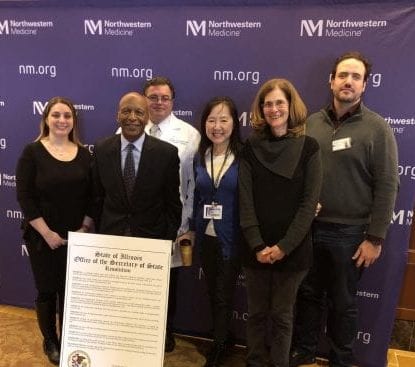The MSL program attracts a wide array of professionals, many of whom complete the program part time while working full time. Our part-time students work all over the Chicagoland area (and beyond), and, with the launch of the online program, all over the world!
Recently, two of our local part-time students, Eleonora Forte and Andre Iovane, were part of a momentous honor at their workplace, Northwestern Medicine’s Comprehensive Transplant Center (CTC), which commemorated the 25th anniversary of the liver transplant program, the 5,000th kidney transplant and the 2,000th liver transplant performed at Northwestern Medicine. To celebrate these milestones, Secretary of State Jesse White presented Dr. Michael Abecassis and the Transplant Team with a proclamation by the City of Chicago signed by Mayor Rahm Emanuel and a resolution signed by Jesse White.
I asked Eleonora Forte (PhD and current MSL student) to give us an inside look at her work with the Center. Read on to learn more about her impactful work.
How long have you worked for Northwestern’s Comprehensive Transplant Center?
I have been working at the CTC since May 2016.
What is your role there?
I am a Senior Research Associate at the Comprehensive Transplant Center (CTC) at Northwestern University where I carry out scientific research on human cytomegalovirus (HCMV), a virus that causes diseases after transplantation.
My day-to-day consists of: planning and performing experiments leading to publications; supervising research staff; reading scientific literature; writing papers, reports, and grant proposals; and attending meetings and seminars.
What are your goals for your work with the CTC moving forward?
The CTC is committed to academic excellence, impactful research, and to developing better care for transplant patients. Reactivation of HCMV remains a significant infectious complication in transplant patients, and can result in life-threatening infections and indirect sequelae, including chronic graft rejection and graft loss. I am part of a multi-team project that aims to better understand the molecular mechanisms that control latency and reactivation of HCMV in response to transplantation for developing new therapeutic strategies to treat, and more importantly, to prevent reactivation of the virus. Specifically, I investigate epigenetic factors that control latency and reactivation of HCMV in hematopoietic progenitor cells, and I am responsible of a genome-wide CRISPR-Cas9 Knockout screening to identify genes essential for HCMV latency and reactivation.
How does the MSL curriculum tie into your work?
The CTC research pursues innovative approaches to define the future of transplantation. The MSL is helping me to acquire the knowledge of regulation and intellectual property that are important in this context. Furthermore, the MSL is making me a better scientist by strengthening my communication and problem-solving skills.






